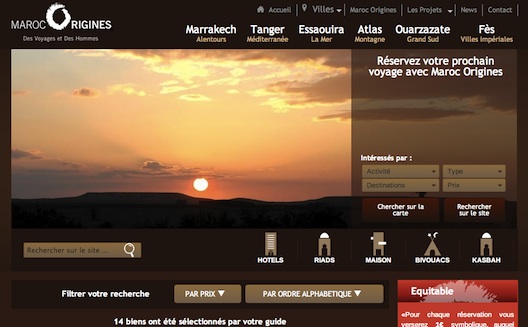How two companies innovated to resuscitate tourism in Tunisia and Morocco

 Over the past few decades, tourism has been an
increasingly important source of revenue for both Morocco and
Tunisia. Both countries are known for their breaktakingly beautiful
sights and the authentic, local feel that only a home-run riad or
guesthouses can offer. In 2010, the sector accounted for 7% of GDP
in both countries Tunisia and Morocco.
The
Arab spring, however, took its toll, especially in Tunisia,
where the number of tourists visiting Tunisia during January
and February in 2011 fell
20.4% compared to the same time period in 2010.
Over the past few decades, tourism has been an
increasingly important source of revenue for both Morocco and
Tunisia. Both countries are known for their breaktakingly beautiful
sights and the authentic, local feel that only a home-run riad or
guesthouses can offer. In 2010, the sector accounted for 7% of GDP
in both countries Tunisia and Morocco.
The
Arab spring, however, took its toll, especially in Tunisia,
where the number of tourists visiting Tunisia during January
and February in 2011 fell
20.4% compared to the same time period in 2010.
Despite these struggles, the tourism industry is getting back on its feet with the help of a few local players. While online booking in the Maghreb is typically dominated by international sites, two companies in particular are reversing the trend.
Tunisia's Online Booking Giant
To call Cyberesa the Travelocity or Expedia of Tunisia would be limiting; in an emerging market, it has not only launched the first online travel agency, Traveltodo, but also works to bring offline travel agencies online, by offering web and mobile solutions.
It's not that most riads and guesthouses don't have an online
presence; most do. Yet they rarely offer online booking. Most
travel agencies on the other hand, were traditionally offline.
Since its launch in 2002, Cyberesa has built platforms for around
90% of the travel agencies that are currently
online, says Wassim Ghliss, the company's
director.
The same year, Cyberesa launched
Traveltodo.
 With backing from Microsoft and Amadeus International, it
has grown to serve 120,000 clients, while its mobile app, which
launched at the end of 2011, has since seen 15,000 downloads- not
bad given Africa's general smartphone penetration rate of 17-19%. “It’s the go-to website to book travels
online” said a friend of mine.
Cyberesa expanded in 2009, opening
an office in Morocco, and later in Algeria and Libya. Soon after in
2010, the company launched Cyberesa.info,
a price comparator that features the agencies it has helped bring
online- again, almost the entire market, according to
Ghliss.
With backing from Microsoft and Amadeus International, it
has grown to serve 120,000 clients, while its mobile app, which
launched at the end of 2011, has since seen 15,000 downloads- not
bad given Africa's general smartphone penetration rate of 17-19%. “It’s the go-to website to book travels
online” said a friend of mine.
Cyberesa expanded in 2009, opening
an office in Morocco, and later in Algeria and Libya. Soon after in
2010, the company launched Cyberesa.info,
a price comparator that features the agencies it has helped bring
online- again, almost the entire market, according to
Ghliss.
Offline booking is still very popular, however, as online booking still only accounts for five to 20% of sales made by Cyberesa’s clients. Yet around 80% of bookings at online agencies are made by locals, says Ghliss, marking a shift towards internal tourism.
Morocco's Responsible Tourism Platform
For those coming to Morocco for the first time, it's not only
the brightly colored textiles, vibrant souqs, and beachfront views
that grab one's attention. Another factor at play is the rampant
poverty, which many tourists notice, but don't know how to
alleviate, says Alexis Franco, the communication manager at
Maroc
Origines.
To solve that problem, Maroc Origines offers tourists the chance to
donate to local charities as they book trips.
While most sustainable tourism agencies in Morocco offer unusual,
off-track experiences like going backpacking in the Atlas, or
living with a family in a farm, Maroc Origines is designed to “make
[sustainable tourism] accessible to people who want to spend
more classical holidays,” Franco explains, thus offering an
experience that can’t be found anywhere else.
Within each booking, the clients, the hotel and Maroc Origines each donate one Euro (a total of three Euros) to a charity project featured on the site. To ensure that the money is put to good use, Maroc Origines has dedicated an independent team that solely focuses on choosing the organizations, which focus on health and education. The company aims to fund 5 to 10 projects with 10,000 to 15,000 Euros in 2014.
This year, the site plans to launch in English (it's currently only in French) and slowly add some local activities such as cooking classes and pottery workshops.
With these unique approaches, both Maroc Origines as well as Cyberesa are finding ways to keep the tourism sector afloat by creating sustainable solutions that hopefully transcend the inlfuence the Arab Spring.
The good news is that these models could be expanded to the rest of the region. In Egypt, Wild Guanabana has taken a similar focus on sustainable trips and volunteer tourism, and expanded to base itself in the Gulf. While there's plenty to focus on in North Africa, perhaps these sites will one day look to scale their models.


